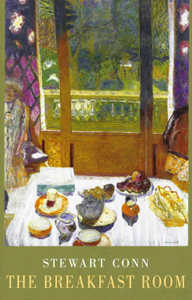Buy this title at Inpress Buy this title at Amazon |
Visit Bloodaxe to see
|
|
Carpe Diem From my study window a daub of powder-blue in a in dappling sunlight, with And my heart misses a beat on a day of such simplicity. |
What the critics say
The Breakfast Room is a perfect filigree-collection of poems, exquisitely balanced between a fresh delight in everyday little events and revelations, and a mature, gently ironic detachment — offering a gaze of wonder and wisdom at the same time. Transience and marginality are possibly its most important themes, and they are explored by Conn with understated formal elegance and poise: discreet assonances and half-rhymes reinforce the collection’s refined minimalism, and enhance the gentle sense of relativity which lies at its heart. This is the work of an accomplished and mature poet ... in his thoughtful attention to small details, his redeeming gaze, his formal control of impeccably constructed verses, his deep and warm humanity. The Breakfast Room is no doubt a collection that will stand as a classic in the years to come. — Professor Carla Sassi, Scottish Mortgage Investment Trust Book of the Year Award 2011
Characteristically restrained, subtly lyrical and filled with gentle humour ... a beautiful and moving collection. — Anne Donovan, The Sunday Herald
The first poems are delightful; playing with mirror images, reflections in train windows, shifting dreamscapes, all composed in a low-key, conversational style. Elsewhere, the metamorphoses are more surreal, with unsettling hints of displacement… Conn is at his most successful when he explores our tendency to superimpose gaiety on grim truths. He writes particularly well about music, pondering the fragility of special things – a camellia house demolished on St Valentine's Day, a flowering cherry salvaged – and the transience of ordinary pleasures. — John Greening, Times Literary Supplement
'The Breakfast Room is a quiet triumph of poetic elegance and wisdom undercut by wryness with the lightest of touches. His craft has become honed, and deceptively simple. Try writing like him, it's soon plain that just because he makes it look easy, it's not. (He is) one of the most technically assured and satisfying poets we have. 'Carpe diem', which ends the collection, is a last word on love poems: Meantime let us / make sure we clasp each / shared moment / in cupped hands, like water / we dare not spill. This acknowledgement of the human condition, how lucky we are, and how transitory and fragile, is what Stewart Conn does best, and is what poetry is all about.' — Pamela Beasant, The Orcadian
It’s [his] ability to identify, to see others with a wry tenderness, that makes The Breakfast Room such a charming read, especially in the love poems that comprise the book’s third and final section. Conn provides intimate portraits of the particular filled with the universal, like ‘the twin-lugged loving cup with our initials/ intertwined, unbreakable because imagined, / Brimful of memories that can never spill’ (‘The Loving Cup’). These love-lyrics are some of the best and most touching poems in the collection, whether portraying the conjuring of intimacy out of absence in ‘Anchorage’ or in ‘Carpe Diem’s evoking the preciousness of time and each other. Conn is droll, wise, and illuminating company. — Phil Sidney, The Literateur www.literateur.com/archives/2377

